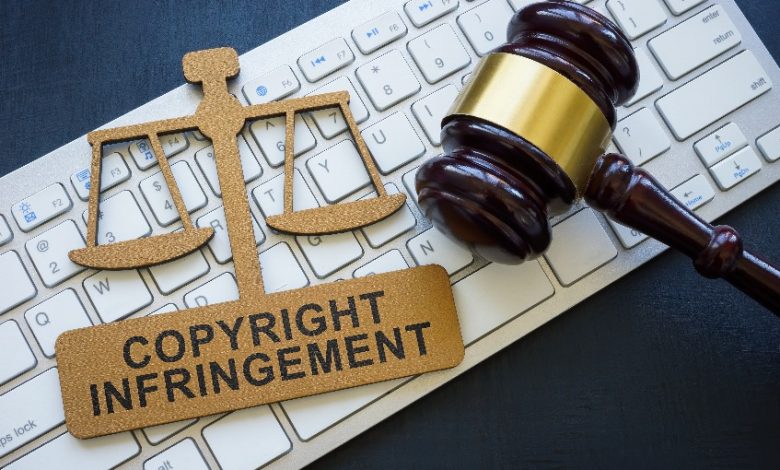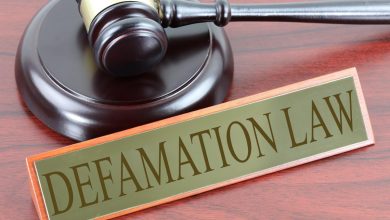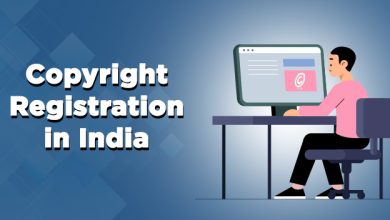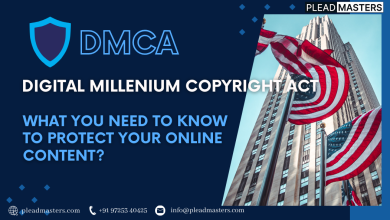Copyright Infringement 101: How to Enforce Your Copyright Protection

Introduction
Have you ever wondered how are you able to watch a movie on your social media accounts which are either available on Netflix or in theatres? If a person does not have a subscription to any streaming platform, they are able to watch it on social media. The reason is copyright infringement. Copyright infringement happens mostly in cases of movies. However, first, let’s understand what is copyright. Copyright refers to a set of rights that are immediately vested in the creator or owner of the original work being produced by them. These can be in the form of artistic, literary work, music, books, movies, etc. Now, if such copyrighted work is replicated wholly or partially without the consent of the creator or owner then such act is copyright infringement.
Therefore, a few questions arise how can copyright be protected? What are the remedies available in such cases? All the questions are answered in this article.
Copyright Infringement
The use or copying of a published or copyrighted work is called copyright infringement. Copyright infringement is the unauthorized use of someone else’s work for the gain of the infringer. Indian law also recognizes this term and defines when a copyright in a work shall be deemed to be infringed under Section 51 of the Copyright Act, 1957.
Examples –
- Downloading a movie from an unauthorized source on the internet
- Posting someone else’s post on your social media platform without giving credit
- When a clip of some videos is used in a YouTube video without giving due credits
- Using music or song or paragraph from an original copyrighted music or song or book without prior permission of the author.
In other words, copyright infringement means using someone else’s work for your profit or publishing under your name without their permission or authorization. We see examples of copyright infringement in our day-to-day lives in the forms of books, movies or music. Moreover, with the advancement of technology, the threat of copyright infringement has increased substantially because now with just a click, anyone can access millions of websites containing other people’s original works.
Types of Copyright Infringement
Copyright infringement is divided into two broad categories:
- Primary infringement- when someone else’s work is actually copied or replicated without their consent, that forms a primary infringement. Under this, the work can either be wholly or partially copied. For example- when a person uses a paragraph from a published book in his own book and gets it published.
- Secondary infringement- secondary infringement takes place when a work is not actually copied. For example- selling pirated copies. Second infringement can be done in the following ways:
- Sale of unauthorized copies- When a person sells an authorized copy of a published work then it violates the rights of the copyright owners.
- Distributing and circulating illegal copies- another form of secondary infringement is the distribution and circulation of illegal copies of the published works of the copyright owner.
Copyright Infringement Damages
There are mainly two kinds of remedies available in copyright infringement i.e. civil and criminal.
Civil Remedies
In civil remedies, damages, and injunctions are sought by the aggrieved parties. Section 55 of the Copyright Act, 1957 deals with civil remedies in case of copyright infringement:
- Section 55(1) of the Act provides the remedy of injunction. It states that the copyright owner is entitled to the remedy of injunction. The injunction is the most sought and effective remedy available in any form of the case especially in copyright infringement. It refers to the judicial procedure whereby the courts restrain the party who infringes the owner’s rights. There are two types of injunctions i.e., interim or permanent.
- Section 55(2) of the Act states that in case a name pretending to be that of an author or publisher appears on the copies of the published work then such person whose name appeared on the copies shall be presumed in any infringement proceedings to the author or publisher of the work unless proved. This happens in cases of literary, dramatic, artistic, or musical work.
Criminal Remedies
Under criminal remedies, the person who does the act of copyright infringement has to undergo imprisonment along with a fine. Section 63 of the Act states that when someone intentionally infringes or abets the infringement of copyright in a work or any right then he/she shall be punishable with imprisonment for a minimum period of 6 months which may go up to a period of 3 years along with a minimum fine of Rs. 50,000 and it may extend upto 2 lakhs.
However, if the person infringing the copyright has not done it to gain profit in the course of trade or business then the court may impose a minimum fine of Rs. 50,000 and imprisonment of a minimum of 6 months.
Copyright Protection Strategies
There are various copyright protection strategies available and some are mentioned below as per Section 52 of the Copyright Act, 1957:
- Registration of Work
The registration of copyright is not mandatory in India. However, it’s recommended to get the works registered in order to claim ownership of the copyrighted work. It helps the owner with claiming his rights on the work and he/she can claim damages or injunction in cases of infringement.
- Doctrine of Fair Dealing
One of the most used and helpful exceptions is the Doctrine of Fair Dealing. This is a legal doctrine also known as fair use. This doctrine allows a person to make use of a work without the permission or authorization of the owner of the original work, however in a restricted manner. It acts as a limitation on the owner’s rights and is mainly based on four factors:
- Purpose and character of the use
- Kind of work
- Effect of use of original work
- Amount of work used
- Purpose and character of use – if a work is used for a non-profit educational purpose then such usage of work without the permission of the owner does not amount to copyright infringement and comes under the meaning of fair dealing.
- Kind of work – this factor means the work being used and the characteristics of the copyrighted work.
- Effect of use of original work – this factor basically means that if a person has purchased or licensed the copyrighted work then the fact weighs against the fair dealing concept. For evaluation of the doctrine, a person has to make an investigation about the availability of the work in the market.
- Amount of work used – there is no definite set of quantities mentioned for this factor. However, it is said that “the more you use, the less you are within the fair use”. Therefore, if a huge portion of an original work is taken then the doctrine would not be applicable. However, if a person even uses small portions of the work then also it may be excessive if they are taking the main content of the copyrighted work.
- The following are other exceptions to copyright infringement:
- Personal use that includes research
- Criticism or review of a work
- Reporting the current events in print media
- Using of computer program
- Adaptation of copies or making of copies of a computer program by the possessor of a copy of the computer program
- Storing of a performance of a work
- Reproducing a work in a judicial proceeding
- Publishing or reproducing a work that is prepared by the secretariat of a legislature for the exclusive use of the legislature members
- Reproducing a work in a certified copy that is supplied or made by the law
- Performance of a drama, literary or musical work by a society or club
- Reproducing in a magazine, newspaper or other periodical journals of an article regarding a recent political, economic, religious or social subjects
- Creation of a three-dimensional object from a two-dimensional artistic work for industrial use
- Reconstruction a structure or a building according to the architectural plans or drawings
- To publish or create a drawing, engrave, paint, photography, display a work of architecture
- Including a work of an artist that is permanently situated in a public place to which the public has access in a cinematograph film
Recent Copyright Infringement Cases
Few of the recent copyright infringement cases are listed below:
- Universal City Studios v Fzmovies.net (2023)
This is the most recent case of copyright infringement decided by the Delhi High Court. In this case, a suit was filed by the Plaintiffs i.e. Universal City Studios, Warner Bros. Entertainment Inc., Netflix Studios LLC and others against the defendants i.e. Fzmovies.net for infringement of their exclusive rights in the original content or work of the plaintiffs. The plaintiffs are the leading entertainment companies which are known across the world to produce movies and have exclusive rights over them for conveying their content to the public at large.
The plaintiffs filed the suit for seeking a permanent injunction, rendition of accounts and also for damages against the infringement under the Copyright Act, 1957 on the ground that the defendants are rogue websites and that they are involved in online piracy. The defendants use the original content of the plaintiffs by making it available for download for the public and providing them access to use such illegal and pirated content.
It was contended by the plaintiffs that the defendant is online locations which empowered them to use the defendant’s websites’ services without permission or authorization or license from the plaintiffs. They allowed streaming or downloading of the plaintiff’s content on devices which are connected to the internet and also allowed the people to keep the downloaded files on their respective devices.
In order to gather evidence and protect their exclusive rights, the plaintiffs investigated and monitored the defendant’s websites’ and found the infringing activities. The defendants were held liable for copyright infringement under Section 51 of the Copyright Act, 1957.
The Court relied upon the judgment passed in UTV Software Communication Ltd. v. 1337X.to, (2019) and restrained the defendants from streaming or hosting or distributing or replicating the content or making it available to the public on their websites through the internet in any manner and did not pass any interim injunction because it would have caused an irreparable loss to the plaintiffs.
- Dassault System Solidworks Corporation & Anr. V. Spartan Engineering Industries Pvt Ltd. Anr. (2021)
This case deals with the issue of digital piracy, another example of copyright infringement. The plaintiff, in this case, is a French company which developed a software known as “Solidworks” which was designed to make modelling and simulating three-dimensational solid items for a variety of industries that includes aerospace, automotive, transportation and etc. The software was created by its employees and the rights for creation belonged to the company, here plaintiff. The respondent in this case, had purchased a license of the software and utilized in gaining access to the copyright of the plaintiff. The issue occurred when the respondent copied the software onto their USB and started selling it for their own gain or profit without paying the required license fee. Hence, this act caused a tremendous loss to the plaintiff.
The plaintiff approached the Court seeking an interim injunction for the use of the pirated version of the software “Solidworks” as this amounted to copyright infringement under Section 51 of the Copyright Act, 1957. The Delhi High Court awarded an injunction in favour of the plaintiff and asked the respondent to pay damages for the act of copyright infringement. the Court restrained the respondent from using, distributing, of reproducing the pirated version of the software which is owned by the plaintiff.
Conclusion
If a person wants to use some other person’s work or anything that is copyrighted, that must be done with their consent and should not be copied or used without permission. Only in cases of exceptions, the copyright infringement does not occur. Hence, it is significant to note that due credits must be given or permission shall be taken before publication of a work consisting of copyrighted work.




